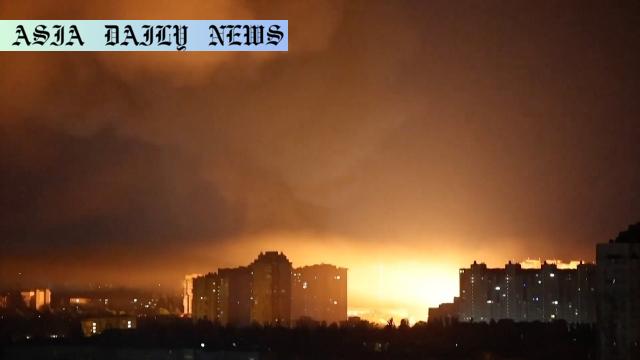Ukraine: Russia launches massive attack targeting Kyiv with 530 drones and 11 missiles amid US suspension of defense aid.
Russia launched one of its biggest attacks on Ukraine, involving over 530 drones and 11 missiles.
The attack primarily targeted Kyiv, killing two people and causing extensive damage to infrastructure.
Ukrainian President Zelenskyy urged international allies for stronger pressure on Moscow to halt attacks.
The US has suspended some weapons shipments to Ukraine, including Patriot air-defense interceptors.
Ukrainian forces responded with a strike on a Russian airfield to weaken Moscow’s airstrike capabilities.

Russia’s Large-Scale Attack on Ukraine
In a display of escalated aggression, Russia has carried out one of its largest attacks against Ukraine. The overnight assault, which targeted the Ukrainian capital, Kyiv, involved more than 530 drones and 11 missiles. The bombardment resulted in the tragic loss of two lives and caused extensive damage to residential areas and key infrastructure, leaving many questioning Ukraine’s current air-defense capabilities.
Reports indicate the timing of the attack coincided with heightened concerns over Ukraine’s defense readiness following the United States’ decision to withhold certain weapons shipments. The halted shipments reportedly include Patriot air-defense interceptors, a critical component of Ukraine’s defensive strategy against Russian aggression.
Zelenskyy’s Call for Stronger International Response
Reacting to the unprecedented scale of the assault, Ukrainian President Volodymyr Zelenskyy took to social media, describing the attack as ‘one of the most massive airstrikes’ faced by the country. President Zelenskyy expressed that continued pressure on Moscow is crucial to thwart their ‘destructive behavior.’ This statement underscores the urgency for international allies, particularly the United States, to consider stronger support for Ukraine amidst growing threats.
The attack highlights the vulnerability Ukraine faces amid geopolitical decisions, particularly as the suspension of weapon support from key allies like the US raises concerns over the country’s ability to safeguard its airspace.
Retaliatory Strike and Strategic Implications
In a countermeasure, Ukraine’s General Staff of the Armed Forces announced an operation targeting an airfield in Russia’s Voronezh region. This strike aimed to disrupt operations at a base housing bombers and fighter jets, which are instrumental in Russia’s airstrike strategy. The decision indicates Ukraine’s proactive approach to undermining Russia’s ability to sustain large-scale offensives.
Analysts believe such measures are critical to evening the playing field, especially as Ukraine seeks to maintain its sovereignty against an adversary equipped with superior resources. However, these moves also come with the risk of further escalation in what has become a prolonged and increasingly destructive conflict.
The International Response and Path Forward
As the news of the attack spreads, the international community faces a renewed urgency to address the volatile situation between Russia and Ukraine. While military support has been a contentious issue, the scale of the current assault may catalyze discussions about more robust intervention strategies to deter Russian aggression effectively.
Beyond the immediate toll on human lives and infrastructure, such attacks pressure global organizations to double down on peacemaking efforts. Whether through sanctions on Moscow, increased arms supply to Kyiv, or diplomatic breakthroughs, the international response will be pivotal in shaping the trajectory of this conflict.
Conclusion: A Need for Cohesive Action
The latest developments underscore the fragility of Ukraine’s position as it faces large-scale attacks amid wavering international commitments. President Zelenskyy’s statements highlight the urgent need for global allies to reassess their support strategies, recognizing that sustained inaction could embolden Moscow further. As both nations continue strategic offensives and escalations, the path to peace seems increasingly elusive, demanding innovative approaches and collective resolve to prevent further devastation.



Commentary
Introducing the Gravity of the Latest Conflict
The recent large-scale attack by Russia against Ukraine serves as one of the starkest reminders of the ongoing human and geopolitical tragedy in this region. The deployment of over 530 drones and 11 missiles signals an alarming escalation, one which the global community cannot afford to ignore. Such acts not only devastate lives and livelihoods, but they also challenge the foundational principles of international law and order.
The Role of International Allies and the US Decision
The United States’ recent suspension of weapons shipments to Ukraine could not have come at a worse moment. For a nation already grappling with defending its territories against an advanced adversary, this decision could diminish Ukraine’s ability to respond effectively. While concerns over resource allocations are valid, the unintended consequences of leaving Ukraine vulnerable could have far-reaching implications, affecting global stability.
Ukraine’s Resilience and Strategic Retaliation
Amid such devastating attacks, Ukraine’s counter-strike on a Russian airfield signals its determination to resist and protect its sovereignty. By targeting key assets integral to Russia’s air operations, Ukrainian forces are attempting to turn the tide in a drawn-out and brutal war. These strategic strikes are not just acts of defense but are vital messages asserting their commitment to survival and resistance.
The Need for Collective Action
Furthermore, President Zelenskyy’s call for heightened pressure on Moscow resonates with the broader concern of inaction from the global community. Nations must step up their collective response, whether it involves sanctions, military aid, or direct negotiations. Allowing Russia to continue unchecked would set a dangerous precedent that compromises principles of sovereignty and peaceful resolution of disputes.
Concluding Thoughts
The escalation in this conflict highlights the urgency of international response and collaboration. Every moment of hesitation risks deepening the crisis, adding to the toll on human life and global harmony. It is a poignant reminder that peace is not a unilateral effort but a collective responsibility requiring unwavering resolve and timely action.